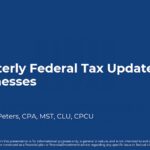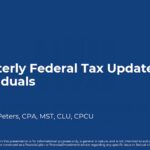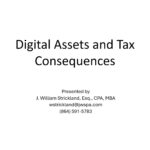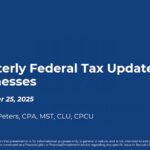As trusted operational partners, Client Advisory Services (CAS) professionals must stay ahead of evolving tax regulations that directly impact their clients. This 2025 update covers critical changes to payroll, information reporting, deductions, and credits—alongside key insights from the new One Big Beautiful Bill Act (OBBBA). Join us to explore how these developments affect CAS engagements and how to proactively position clients for success in the year ahead.
Enrolled Agent Approved
South Carolina Update & Cases
This session provides a comprehensive update on recent legislative, regulatory, and case law developments affecting South Carolina tax and estate planning. The presentation covers new revenue rulings, procedures, and notices issued for 2025, including interest rates, safe harbor provisions for trusts with digital assets, and transitional relief for tip and overtime reporting. It also reviews cost-of-living adjustments for retirement plans, enacted legislation such as the extended rule against perpetuities, and updates to the South Carolina Department of Revenue’s website and policy manuals. The session concludes with a detailed analysis of recent state and federal court cases impacting tax, probate, and property law in South Carolina.
Federal Tax Update for Business
This session provides a comprehensive quarterly update on recent federal tax law changes affecting businesses, with a focus on the One Big Beautiful Bill Act (OBBBA) signed in July 2025. The presentation covers new and expiring tax provisions, including depreciation, energy credits, partnership regulations, reporting thresholds, and other significant updates relevant to business tax planning and compliance.
Enrolled Agent Approved
Federal Tax Update for Individuals
This session provides a comprehensive quarterly update on federal tax changes affecting individual taxpayers, focusing on recent legislative developments, new deductions, and clarifications to existing tax provisions. Attendees will gain insights into permanent and temporary changes to tax brackets, deductions, credits, and exclusions, including updates on the OBBBA, tip and overtime deductions, opportunity zones, Trump accounts, and other key topics relevant for tax planning and compliance in the upcoming year.
Enrolled Agent Approved
Tax Talks With Bill: Year-End Tax Wrap-Up & 2026 Predictions
Year end tax planning issues.
Enrolled Agent Approved
Capital Gains & Losses
This session provides a comprehensive overview of U.S. federal tax rules for capital gains and losses, covering asset classification, calculation and reporting of gains and losses, special tax provisions, and practical tax planning strategies for individuals and businesses.
Enrolled Agent Approved
Digital Assets & Tax Consequences
This session provides a comprehensive overview of digital assets, including cryptocurrencies and non-fungible tokens (NFTs), their underlying blockchain technology, and the evolving landscape of financial applications. It explains how digital assets are classified and taxed under current IRS rules, highlights key reporting requirements, and discusses recent legislative updates such as the GENIUS Act and CLARITY Bill. The presentation also covers common tax issues, compliance tips, and resources for further guidance on digital asset taxation.
Enrolled Agent Approved
2025 Tax Planning Based on Form 1040 Part II
The many changes made to the Internal Revenue Code have created numerous unique planning opportunities for individuals. Careful tax planners must weigh current rules with an eye toward the future. This course will assist the practitioner in charting alternatives and guiding clients through these complex tax times. Planning is a year-round process, and this course is loaded with ideas that can be used throughout the year to reduce taxes. Among the ideas discussed will be the Alternative Minimum Tax, charitable giving, tax-saving strategies for real estate owners and investors, and much more. Working systematically through Form 1040, the practitioner will be given many ideas on how to reduce taxes through planning.
Enrolled Agent Approved
Tax Planning Based on Form 1040 – Part I
The many changes made to the Internal Revenue Code have created numerous unique planning opportunities for individuals. Careful tax planners must weigh current rules with an eye toward the future. This course will assist the practitioner in charting alternatives and guiding clients through these complex tax times. Planning is a year-round process, and this course is loaded with ideas that can be used throughout the year to reduce taxes. Among the ideas discussed will be the Alternative Minimum Tax, charitable giving, tax-saving strategies for real estate owners and investors, and much more. Working systematically through Form 1040, the practitioner will be given many ideas on how to reduce taxes through planning.
Enrolled Agent Approved
Keeping Up With the Tax Code – 2nd Quarter Federal Tax Update
Being a tax practitioner over the last few years has been tough! The tax landscape is constantly changing and this shows no signs of slowing down! Now more than ever, you need more than just new code sections hurled your way. You need to have a reliable way to stay on top of not only new tax legislation, but also know about areas of focus from the IRS, emerging topics, and current industry thinking on important issues. In our quarterly federal tax update series, we will be addressing not only new regulations, but also hard to navigate areas for practitioners. In December 2025, through discussion and easy to follow examples, we will help you to stay current and be ready to tackle the most pressing client questions throughout the year – not just at the end of the year!
Enrolled Agent Approved










